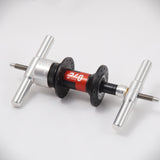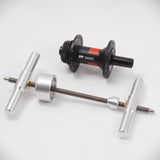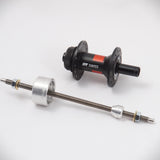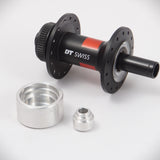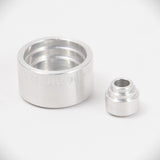Wind-Out Bearing Puller for Over-axle Hub Bearings
Regular price £37.00
Wind-Out Bearing Puller for Over-Axle Hub Bearings
*** Buy one, get one 30% off any mix of pullers and presses (applies to individual tools only, not kits) ***
Many hubs feature an over-axle design, i.e., there is an axle that protrudes through the bearings that cannot be removed until after the bearing is removed (all Hope and DT Swiss rear hubs use this design, along with many other manufacturers). This axle also prevents access to the inside of the bearing with our expanding pullers.
Typically, the bearing is removed from an over-axle hub by tapping on the axle with a soft mallet.
This tool offers an alternative; the bearings in front and rear over-axle hubs can be removed in a safe and controlled manor by simply tightening a screw.
Note:
Note:

How To Use
This tool is easy to use.
- First, ensure that any lockrings holding the bearings into the hub are removed.
- Place the tool's small drift on the drive side end of the axle.
- Place the tool's 'cup' on the non-drive side. It is important that there is at least 8mm clearance between the end of the axle and the bottom of the cup.
- Feed the threaded bar through the tool and the axle, then fit the nuts/T-bars to either end.
- Tighten the nuts/T-bars should draw the non-drive side bearing into the cup. It shouldn't require much force.
- Once the bearing is free, disassemble the tool. Re-install the axle into the hub body but this time with the short non-drive side of the axle in the drive side bearing. The process can then be repeated as above to remove the drive side bearing. (If you have a DT Swiss EXP rear hub, skip this step, see the procedure here instead).
See our manuals page to download the more detailed instruction sheets which come withour press orders, now available in several languages.
Other Tools for Hubs
We have a growing range of hub tools, including over-axle bearing presses, seal drifts, axle protectors and more.
Our '30% off second item' discount can be used for a mix of tools.
Shipping
We aim to dispatch all orders within 1 working day
Orders within the UK will be shipped by Royal Mail RM24 (First Class)
International orders are welcomed and will be shipped by DHL GlobalMail or Royal Mail International Standard (Airmail). Please refer to our Shipping & Taxes page for more info.
Our tools can be selected either by the bearing's dimensions or by the bearing's standard reference code.
Standard references take the form of a three to five digit number, such as 688, or 6902 for example. These codes are often provided in the bike's user manuals, or moulded onto the bearing's seal. You might see something like 6902-2RS on the seal. The first digits are the standard reference. The second part (2RS in this case) refers to the seal type and doesn't matter for tool selection.
While the letter & numbers after the baring ref usually refer to the type of seal, you should keep an eye out for the suffix 'E', for example 698-E. This denotes that the inner race of the bearing is extended, which will affect puller and press selection.
Alternatively, tools can be selected by their inside (ID) and outside (OD) diameters and width (W).
Note that each tool is specific to one bearing size and can’t be used on bearings with different dimensions.
If you need any help then please feel free to email us! We usually reply within 1 working day.






